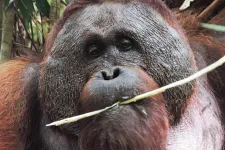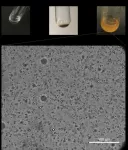(Press-News.org) Wild orangutans are known for their ability to survive food shortages, but scientists have made a surprising finding that highlights the need to protect the habitat of these critically endangered primates, which face rapid habitat destruction and threats linked to climate change.
Scientists found that the muscle mass of orangutans on the island of Borneo in Southeast Asia was significantly lower when less fruit was available. That's remarkable because orangutans are thought to be especially good at storing and using fat for energy, according a Rutgers-led study in the journal Scientific Reports.
The findings highlight that any further disruption of their fruit supply could have dire consequences for their health and survival.
"Conservation plans must consider the availability of fruit in forest patches or corridors that orangutans may need to occupy as deforestation continues across their range," said lead author END
Orangutan finding highlights need to protect habitat
Iconic great apes in Borneo lost muscle during fruit shortages
2021-05-13
ELSE PRESS RELEASES FROM THIS DATE:
Life may have become cellular by using unusual molecules
2021-05-13
All modern life is composed of cells, from single-celled bacteria to more complex organisms such as humans, which may contain billions or even trillions of cells, but how life came to be cellular remains uncertain. New research led by specially appointed assistant professor Tony Z. Jia at the Earth-Life Science Institute (ELSI) at Tokyo Institute of Technology, along with colleagues from around the world (Japan, Malaysia, France, Czech Republic, India and the USA), shows that simple chemical compounds known as hydroxy acids, which were likely common on primitive Earth, spontaneously link together ...
Scientists find molecular patterns that may help identify extraterrestrial life
2021-05-13
Scientists have begun the search for extraterrestrial life in the Solar System in earnest, but such life may be subtly or profoundly different from Earth-life, and methods based on detecting particular molecules as biosignatures may not apply to life with a different evolutionary history. A new study by a joint Japan/US-based team, led by researchers at the Earth-Life Science Institute (ELSI) at the Tokyo Institute of Technology, has developed a machine learning technique which assesses complex organic mixtures using mass spectrometry to reliably classify them as biological or abiological.
In season 1, episode 29 ("Operation: Annihilate!") of Star Trek, which aired in 1966, the human-Vulcan hybrid character ...
Congestion pricing could shrink car size
2021-05-13
PULLMAN, Wash. - Rush hour will likely return when pandemic lockdowns lift, but a new study suggests that congestion pricing--policies that charge tolls for driving during peak hours--could not only cure traffic jams but also convince motorists it is safe to buy smaller, more efficient cars.
Researchers from Washington State University and the Brookings Institution studied a sample of nearly 300 households in the Seattle area over a six-year period, finding that the more congested their commutes, the more likely they would buy bigger cars which they perceive as safer and more ...
Study finds that obesity drug semaglutide supresses appetite, food cravings and energy intake
2021-05-13
New research presented at this year's European Congress on Obesity (held online, 10-13 May) shows that the obesity drug semaglutide reduces appetite, food cravings and energy intake in people given a meal where they could eat as much as they liked. The study is by Dr Dorthe Skovgaard, Novo Nordisk A/S (the manufacturer of the drug), Søborg, Denmark, and colleagues.
Semaglutide, in the glucagon-like peptide-1 (GLP-1) analogue drug class, is currently available at the dose of 1.0 mg injected once weekly for the treatment of type 2 diabetes and is under development for chronic weight management at the dose ...
New experimental drug cagrilintide (AM833), when combined with emaglutide, shows potential for treatment of obesity (The Lancet)
2021-05-13
An early study of a new experimental drug to treat obesity known as cagrilintide shows that, when combined with semaglutide 2.4 mg, the combination leads to more weight loss than semaglutide 2.4 mg alone and is well tolerated. This phase 1 study, which was recently published in The Lancet will be presented at this year's European Congress on Obesity (held online, 10-13 May) by Dr Lone Enebo, Novo Nordisk A/S, Denmark, on behalf of her colleagues. Novo Nordisk A/S is the manufacturer of both drugs in this study.
Combining medications with different modes of action may provide more effective treatment options for people with obesity. Weekly injections of cagrilintide, ...
Two-thirds of California prison residents offered COVID vaccine accepted at least one dose
2021-05-13
Two-thirds of California prisoners who were offered a COVID-19 vaccine accepted at least one dose, according to a new study by researchers at the Stanford University School of Medicine.
"We found that many incarcerated people in California prisons were willing to be vaccinated for COVID-19," said Elizabeth Chin, the lead author of the study and a PhD candidate in biomedical data science. "This is an encouraging sign for other states at an early stage of rolling out vaccination programs in their prisons and jails."
The researchers also found that nearly half of those who initially turned down a COVID-19 vaccine accepted it when it was offered to them again. The finding is an important indication that vaccine hesitancy is not necessarily fixed.
Two-thirds ...
Previously unknown letter reveals Einstein's thinking on bees, birds and physics
2021-05-13
The 1949 letter by the physicist and Nobel laureate discusses bees, birds and whether new physics principles could come from studying animal senses.
It's a position still being realised within physics to this day, with a growing body of research and understanding of how animals such as birds and bees find their way around.
Now a study led by RMIT University in Melbourne, Australia, discusses how recent discoveries in migratory birds back up Einstein's thinking 72 years ago.
The previously unpublished letter was shared with researchers by Judith Davys - Einstein had addressed ...
COVID-19 is not influenza, but it offers lessons on beating it, say Concordia researchers
2021-05-12
If you did not catch the flu this year -- and there is an overwhelming chance that you did not -- you have COVID-19 to thank.
It's a small consolation, given the enormously disruptive scope of the pandemic. But it's the focus of a new paper published in the journal Frontiers in Public Health by two Concordia researchers and their colleagues that studies the 2020 influenza figures from Canada, the United States, Australia and Brazil. The authors show there is a clear relationship between the implementation of COVID-mitigation measures such as hand-washing, masking and social distancing and the spread of the annual flu.
They write that these preventive measures all but eliminated ...
Breakthrough could lead to early detection of pregnancy complications
2021-05-12
The quest to create safer, more successful pregnancies is one of the top goals of modern science. While pregnancy is better understood today than ever before, with improvements in technology helping to lower the risk of negative outcomes, there is much researchers still don't know about a vital part of the pregnancy process: uterine fluid.
Secreted by glands in the uterus during pregnancy, uterine fluid is believed to play an important role in supporting a developing embryo by sending information from the uterus to the embryo, along with a host ...
Backyard chickens, rabbits, soybeans can meet household protein demand
2021-05-12
In 2020, stores sold out of garden seed, coops and rabbit cages. Now, we have an idea how much protein people can grow in their backyards.
The 2020 meat shortages led many to wonder what to eat for protein when supply chains are disrupted. Some people turned to gathering eggs, raising animals and growing their own food. A team from Michigan Technological University and the University of Alaska Fairbanks found that the work is well worth it. In a new study published in Sustainability, the researchers looked at how a typical household with a typical backyard can raise chickens, rabbits or soybeans to meet its protein needs.
People eat a lot of protein in the U.S. and the average person needs 51 grams of ...
LAST 30 PRESS RELEASES:
Novel camel antimicrobial peptides show promise against drug-resistant bacteria
Scientists discover why we know when to stop scratching an itch
A hidden reason inner ear cells die – and what it means for preventing hearing loss
Researchers discover how tuberculosis bacteria use a “stealth” mechanism to evade the immune system
New microscopy technique lets scientists see cells in unprecedented detail and color
Sometimes less is more: Scientists rethink how to pack medicine into tiny delivery capsules
Scientists build low-cost microscope to study living cells in zero gravity
The Biophysical Journal names Denis V. Titov the 2025 Paper of the Year-Early Career Investigator awardee
Scientists show how your body senses cold—and why menthol feels cool
Scientists deliver new molecule for getting DNA into cells
Study reveals insights about brain regions linked to OCD, informing potential treatments
Does ocean saltiness influence El Niño?
2026 Young Investigators: ONR celebrates new talent tackling warfighter challenges
Genetics help explain who gets the ‘telltale tingle’ from music, art and literature
Many Americans misunderstand medical aid in dying laws
Researchers publish landmark infectious disease study in ‘Science’
New NSF award supports innovative role-playing game approach to strengthening research security in academia
Kumar named to ACMA Emerging Leaders Program for 2026
AI language models could transform aquatic environmental risk assessment
New isotope tools reveal hidden pathways reshaping the global nitrogen cycle
Study reveals how antibiotic structure controls removal from water using biochar
Why chronic pain lasts longer in women: Immune cells offer clues
Toxic exposure creates epigenetic disease risk over 20 generations
More time spent on social media linked to steroid use intentions among boys and men
New study suggests a “kick it while it’s down” approach to cancer treatment could improve cure rates
Milken Institute, Ann Theodore Foundation launch new grant to support clinical trial for potential sarcoidosis treatment
New strategies boost effectiveness of CAR-NK therapy against cancer
Study: Adolescent cannabis use linked to doubling risk of psychotic and bipolar disorders
Invisible harms: drug-related deaths spike after hurricanes and tropical storms
Adolescent cannabis use and risk of psychotic, bipolar, depressive, and anxiety disorders
[Press-News.org] Orangutan finding highlights need to protect habitatIconic great apes in Borneo lost muscle during fruit shortages






